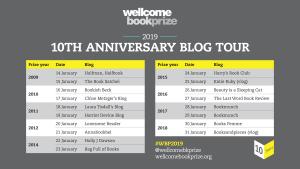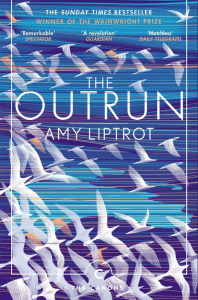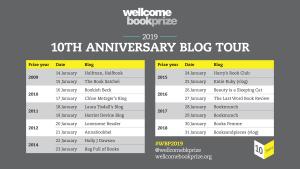
I was so pleased when I was invited to participate in the Wellcome Book Prize 10th Anniversary Tour and review one of the titles. There are so many literary prizes, but the Wellcome Prize is one of the most interesting to me because it is given to books that illuminate the many ways that health, medicine and illness touch our lives. 2019 marks the 10th anniversary of this prestigious award. Over the last decade, the prize has gone to a variety of titles from novels (Mend the Living, Maylis de Kerangal) to memoirs (The Iceberg, Marion Coutts) to popular science (It’s All in Your Head, Suzanne O’Sullivan).
I was offered to choose from the 2016 short list, including its winning title It’s All in Your Head by Suzanne O’Sullivan.
2016 Shortlist:Playthings by Alex Pheby; The Last Act of Love by Cathy Rentzenbrink; Neurotribes by Steve Silberman; Signs for Lost Children by Sarah Moss; The Outrun by Amy Liptrot.

There were many books on the list I felt tempted to read but I decided to choose Amy Liptrot’s memoir The Outrun because I was interested to see how the wild, as the blurb says, restored her life and renewed her hope.
At the age of thirty, after ten years of hard binge drinking, Amy returns to Orkney. Ten years earlier, she’s left the Scottish island in search of a more glamorous life in London. As soon as she arrived in London, she started to party, hang out with people in parks, take drugs and binge drink. It often seemed as if she was homesick.
But sometimes a smell in the air would remind me sharply that I was living in England. This leafy country with its red-brick skyline was not my home. I yearned for the open skies and gray stone of Orkney. I missed the curlews and oyster-catchers, even the black-backed gulls. Sometimes I’d be walking down Bethnal Green Road, surprised by the tears rolling silently down my face. (p. 37/38)
Although I’d left, and had wanted to leave, Orkney and the cliffs held me, and when I was away I always had, somewhere inside, a quietly vibrating sense of loss and disturbance. (p.50)
At the beginning of the memoir, she’s out of rehab and back where she came from, on Orkney. Bit by bit, we learn about her chaotic life in London, the excessive drinking that often ends with her blacking-out. When she is getting worse and worse, her boyfriend leaves her, she looses her job, and her apartment. Unfortunately, this isn’t enough and her drinking intensifies even more. Often she wakes up in places and with people she doesn’t know. Often, she starts drinking again right after waking up to fight a terrible hangover.
I heard it said that in London you’re always looking for either a job, a house or a lover. I did not realize how easily and how fast I could lose all three. (p. 43)
Reading about her excesses made me wonder how it was even possible that she managed to give up drinking. For years there was nothing else in her life but one bottle after the other. People started to avoid her because she was loud and rowdy, destroyed things, lost things, had accidents. She was such a mess.
My behavior brought tension into the household: unpredictable noise levels; Tuesday night parties with strangers, men I brought home; leaving my handbag outside the front door and possessions trailing up the stairs. These episodes were followed by the depressive shadow of my hung-over days in bed. (p.56)
And then, one night, something terrible happens and this might very well have been the deciding factor. While she did stop drinking occasionally and tried to stay away from alcohol before, it never lasted long. But after that night, which was a wake-up call for her, she enters a day rehab. One week of detox, assisted by Librium, was followed by twelve weeks of group therapy. One of the hardest things, in my opinion, is that she wasn’t allowed to stay at the rehab center but had to go home and face temptation every night. She lived over a pub in Hackney Wick. I don’t know Amy, but reading about this and knowing she made it, made me proud of her. It sounded like such a hard thing to do.
Once the program at the rehab center is finished, she returns to Orkney where she tracks birds, swims in ice-cold water, watches the night sky.
The descriptions of this harsh but beautiful landscape are amazing. Especially so, because we see them through Amy’s eyes whose every sense seems to reawaken now that she’s off the booze.
I loved this memoir so much. I could quote endlessly from it and I’m in awe because the fight is so intense. As Amy writes, even 20 months after she quit drinking, she still fantasizes about drinking all the time.
Through repeated use of the drug, our neural pathways are scored so deeply they will never be repaired.I will always be vulnerable to relapse and other kinds of addiction.
I’m crying. I’m sober, twenty months and eight days now, and I like the changes happening in my life but I’m still often frustrated about not being ‘able’ to drink. I’m sober but I would like drink.It’s a painful paradox to live in. (p.180).
It’s only towards the end of the book, and a long stay on Orkney, and a winter on her own on a much smaller island, Papa Westray, that the alcohol slowly lets go of her. There’s so much hope at the end and such a keen appreciation of life and nature. I also loved what she wrote about finding a new identity. For ten long years, her identity was rooted in her drinking. What would be left after that was gone?
I can’t recommend this highly enough. It’s an amazing insight into someone’s addiction and recovery and a fabulous account of life on Orkney. I could see the many migratory birds, feel the icy cold of the water, the force of the gales, and the beauty of the constellations in the night sky.
In defiance of this dissatisfaction, I’m conducting my own form of therapy through long walks, cold swims and methodically reading old journals. I’m learning to identify and savour freedom: freedom of place, freedom of damaging compulsion. I’m filling the void with new knowledge and moments of beauty. (p.180)

Don’t miss visiting the other blogs. You’ll discover many amazing books.
I’d like to dedicate this review to my beloved cousin, Olivier, who suffered from the same addiction as Amy but sadly didn’t make it.
